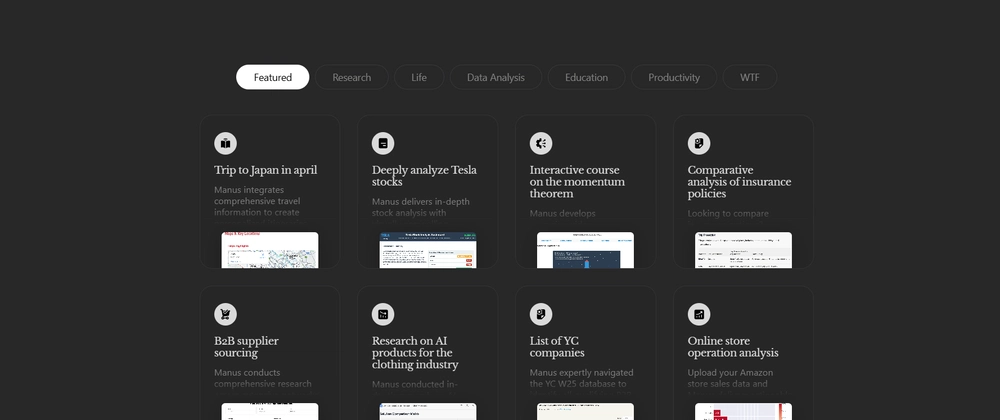Multi-Agent AI Platforms: Manus Broad Research Orchestrates 100+ Autonomous Agents for Scientific Discovery

Introduction
A new era in collaborative artificial intelligence has dawned with the debut of Manus Broad Research, a platform that orchestrates over 100 independent but cooperative AI agents to accelerate complex scientific research. Launched in July 2025, this multi-agent system marks a transformative leap beyond single-LLM architectures and opens a fast-growing frontier for scalable, team-based AI workflows[2].
Manus Broad Research: A Technical and Functional Leap
The core breakthrough of Broad Research is its simultaneous operation of over 100 general-purpose AI agents. Each agent can operate independently—generating ideas, analyzing data, or running simulations—but they’re also programmed to coordinate in real time toward shared research objectives. This goes far beyond previously available AI tools, where interactions between agents were typically shallow or restricted to narrow roles.
According to developers at Manus, Broad Research is already enabling complex workflows in biosciences, chemistry, and data-intensive fields. For example, teams of agents can collectively sort genomics datasets, design follow-up experiments, and flag anomalous results, all while communicating through a common task protocol. Early benchmarks show material speed-ups: broad research tasks that took weeks by conventional methods can now be completed in days[2].
Impact: From Virtual Labs to Scientific “Co-Scientists”
The significance of Broad Research extends beyond automation. In biosciences, it enables the simulation of entire virtual research teams, each composed of AI "supporting scientists" and "principal investigators" that direct in silico experiments[2]. This allows for high-throughput hypothesis generation and iterative testing that are unfeasible in traditional research environments. "The ability to virtually staff an entire research group with AI means parallelized exploration of problems at unprecedented scale," notes Dr. Evan Su, a computational biology pioneer.
Similar strategies are being adopted industry-wide: Google's AI Co-Scientist runs multi-agent Gemini models for hypothesis testing, and Alphabet’s Isomorphic Labs prepares the first clinical trials for AI-designed drugs developed in collaborative agentic environments[2].
Conclusion: The Multi-Agent Future of AI Research
With launches like Manus Broad Research, the paradigm of a single all-knowing AI is giving way to decentralized, agent-based intelligence. Such platforms are poised to not only accelerate scientific discovery but also to shape how collaborative, interdisciplinary workflows are designed in the future. Experts predict that as multi-agent coordination becomes more robust and accessible, industries from healthcare to climate science will see radical improvements in speed, innovation, and transparency. However, calls remain for new ethical guidelines and infrastructure capable of coping with the complexity—and potential risks—of hundreds of autonomous AIs pursuing human-specified goals in parallel[2].
How Communities View Multi-Agent AI Research Platforms
Introduction: The debut of Manus Broad Research has ignited discussions across Twitter/X and Reddit regarding the scalability, utility, and potential risks of orchestrating fleets of autonomous AI agents in scientific research.
Dominant Opinion Clusters:
-
1. Enthusiastic Technologists (≈45%): Many in r/MachineLearning, r/artificial, and on X (e.g. @alexkajitani) are excited about the scale and efficiency leap that 100+ agent platforms represent. Key posts highlight potential for accelerating cancer research and rapid experimental iterations. Representative post: "Imagine a lab of 200 scientists, all AI, working 24/7. It’s science fiction gone real" (@samg_tech).
-
2. Cautious Academics & Researchers (≈25%): A significant group emphasizes the need for careful validation, citing replication concerns and complexity in debugging agentic workflows. "Collaboration is great, but how do we ensure AI 'lab mates' don't go rogue or reinforce errors?" asked r/datascience user u/turing_mode.
-
3. Ethical Watchdogs & Risk Commentators (≈20%): Ethicists and AI policy analysts on Twitter (e.g., @sarah_ai_ethics) warn about transparency, bias propagation, and governance challenges. Reddit threads on r/Futurology debate whether multi-agent models could "outpace" human oversight, especially if agents develop emergent behaviors.
-
4. Industry Optimists (≈10%): Some investors and startup founders, especially on X (@gingertechAI), tout the disruptive business potential, forecasting new IP models and faster product pipelines. "Agent teams are the future of pharma and energy research—whoever masters this will dominate next-gen R&D," wrote one high-engagement thread.
Overall Sentiment: Positive-to-cautious. While most see opportunity for research acceleration, there’s widespread consensus that robust monitoring, validation tools, and new norms are needed to manage both the promise and complexity of large-scale multi-agent AI.